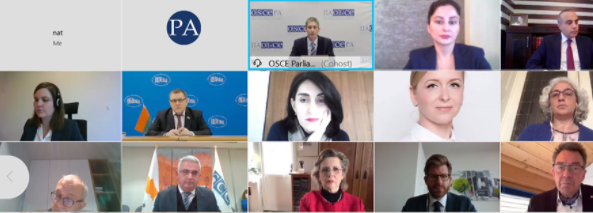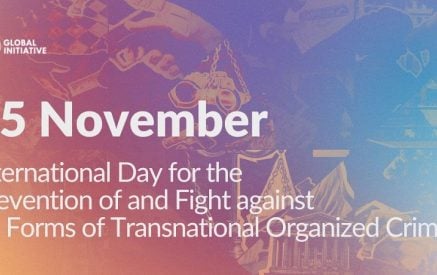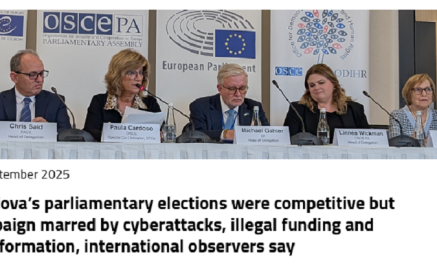COPENHAGEN, 12 March 2021 – Despite the COVID-19 pandemic and related calls for a global ceasefire, conflicts continued to impact civilian populations in the OSCE area over the past year, resulting in thousands of deaths, displacement and denial of basic rights, participants said at today’s OSCE Parliamentary Assembly webinar, entitled “Humanitarian protection and human rights in conflict zones.”
With more than 125 participants, including OSCE PA President Peter Lord Bowness (United Kingdom) and parliamentarians from several countries impacted by conflicts, the webinar focused on how to improve the humanitarian situation in conflict zones, strengthen the commitment to international humanitarian law, and address the long-term consequences of displacement. Regretting that conflicts persist in the 21st century, President Bowness noted that the Parliamentary Assembly continues to pay considerable attention to the humanitarian impact caused by the Nagorno-Karabakh conflict and to the situation in countries such as Ukraine, Moldova, and Georgia.
The meeting featured presentations by Peter Maurer, President of the International Committee of the Red Cross (ICRC), and Ambassador Yaşar Halit Çevik, Chief Monitor of the OSCE Special Monitoring Mission (SMM) to Ukraine, followed by an open discussion. In welcoming remarks, Cypriot parliamentarian Kyriakos Hadjiyianni, Chair of the OSCE PA’s Committee on Democracy, Human Rights and Humanitarian Questions, highlighted continuing problems within the OSCE area regarding the lack of adequate humanitarian protection and respect for human rights in conflict zones.
“Throughout the last year, we have sadly witnessed the repeated resort to the use of force and the resumption of hostilities, causing immense hardship for the affected populations,” said Hadjiyianni in his opening remarks. “I believe that it is our task as parliamentarians to rally together to hold our governments to account and to work on behalf of all those who are impacted and who have lost their dignity or property to the scourge of war,” he said.
Read also
Highlighting the conflict in Ukraine, which is now in its eighth year, and unresolved conflicts in the Caucasus, the Balkans and Moldova, ICRC President Maurer described serious humanitarian impacts particularly in the context of the COVID-19 pandemic. During the escalation of the Nagorno-Karabakh conflict last year, he said, the ICRC received reports of indiscriminate shelling and other alleged unlawful attacks using explosive weaponry in cities, towns and other populated areas, causing civilian deaths and injuries, as well as the destruction of key infrastructure.
“Any intensification of hostilities affects the wellbeing and drains the livelihoods of people and communities,” he said. “In Ukraine, children and adults in the conflict area continue to suffer from the fear of shelling and bombs explosions and even go to schools situated at the very contact line.” He noted that this impact is compounded by the pandemic and the related economic disruption that has had a severe effect on people’s income and financial security.
Maurer urged OSCE parliamentarians to influence their governments and adopt laws to reinforce the commitment to strengthening human security, including by ensuring that international humanitarian law is respected by all sides at all times and that humanitarian aid is fully supported.
Presenting the work of the SMM and sharing his observations regarding the impact of the conflict on civilians, Ambassador Çevik noted that the security situation on the ground has improved since the parties to the conflict agreed on strengthening the ceasefire on 22 July last year, but the humanitarian situation is still dire.
“Civilians living near the contact line in eastern Ukraine remain highly vulnerable and exposed to severe hardships,” said Ambassador Çevik. The SMM, he reported, has recently corroborated civilian casualties due to shelling, damages to houses and a school. “The Mission also regularly receives reports about civilians’ lack of access to basic services,” Çevik said.
The Chief Monitor underlined that political will and progress during negotiations are essential for maintaining an improved security situation and creating the conditions for further improvements in the humanitarian situation, pledging that the SMM will continue to work with all actors, including OSCE institutions and executive structures, to contribute to tangible progress for the benefit of civilians on the ground. He encouraged stakeholders to be mindful of the importance of humanitarian considerations and urged that these issues not be politicized.
In the discussion, OSCE parliamentarians stressed the need for greater international co-operation to improve the situation in conflict zones. The OSCE PA has a role to play in developing a multilateral approach to conflict resolution and improving international humanitarian law, participants said, including by strengthening legal frameworks.
Parliamentarians highlighted issues including involving young people in conflict resolution and reconciliation. Ensuring respect for religious freedom and other fundamental freedoms in conflict zones was also emphasized.
Kari Henriksen, OSCE PA Vice-President and Rapporteur of the human rights committee, shared with colleagues her efforts in the Norwegian parliament to highlight conflict-related humanitarian issues and urged her colleagues to do the same. OSCE parliamentarians have a duty to make sure that OSCE commitments are fulfilled by governments, she underlined.
To watch the full discussion, please visit the OSCE PA’s YouTube channel.
OSCE Parliamentary Assembly






















































